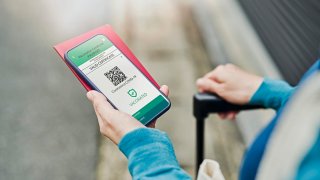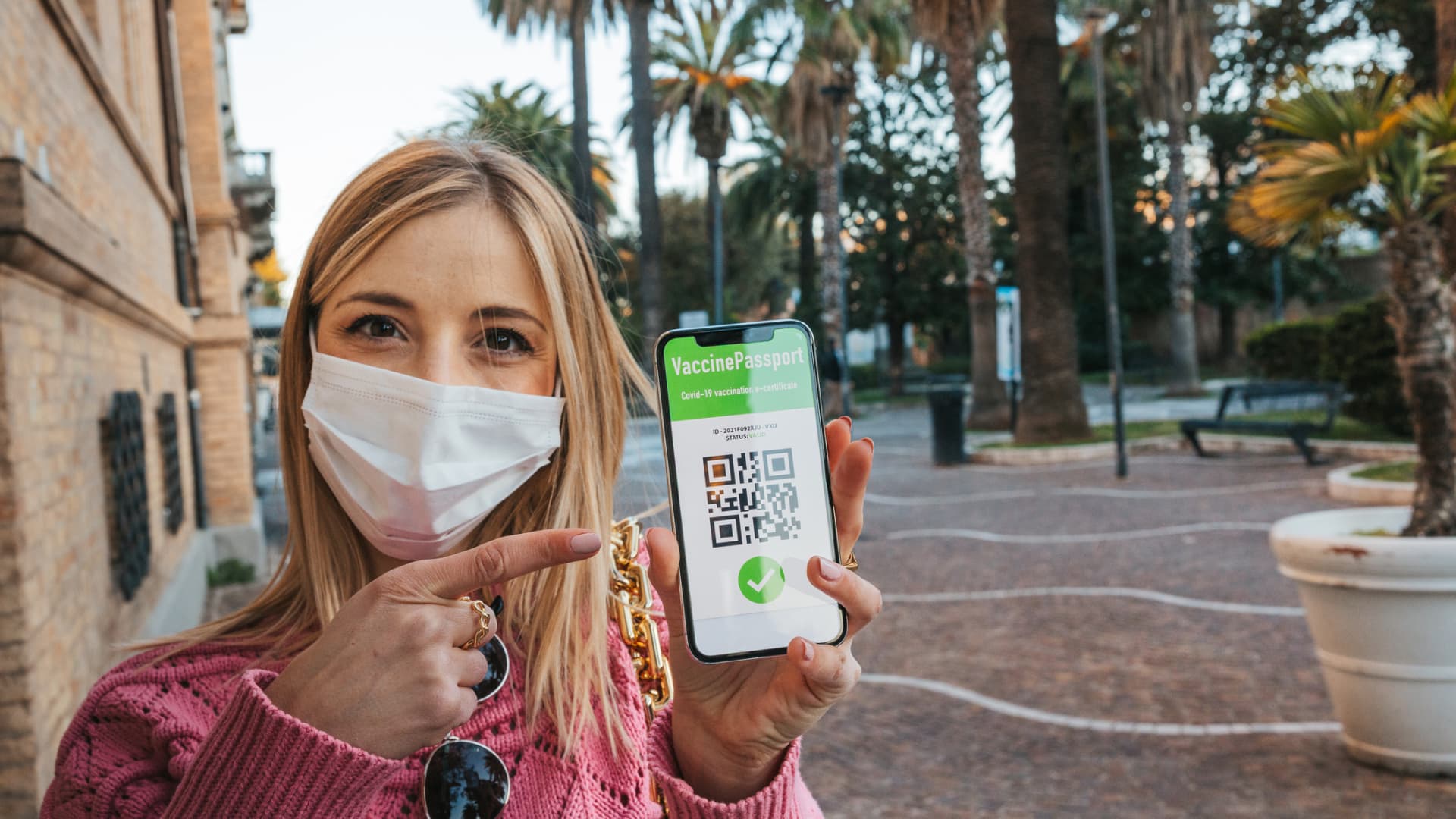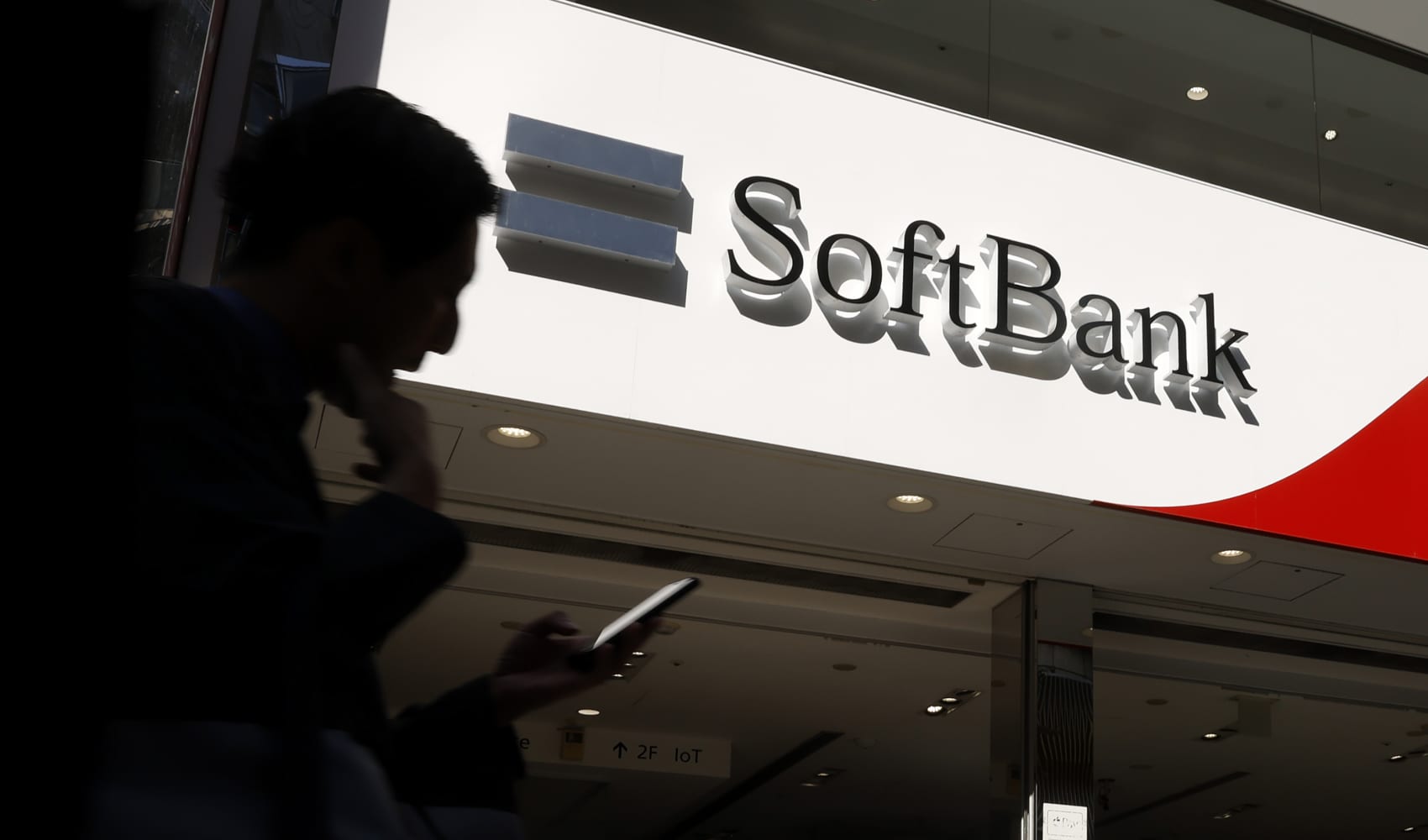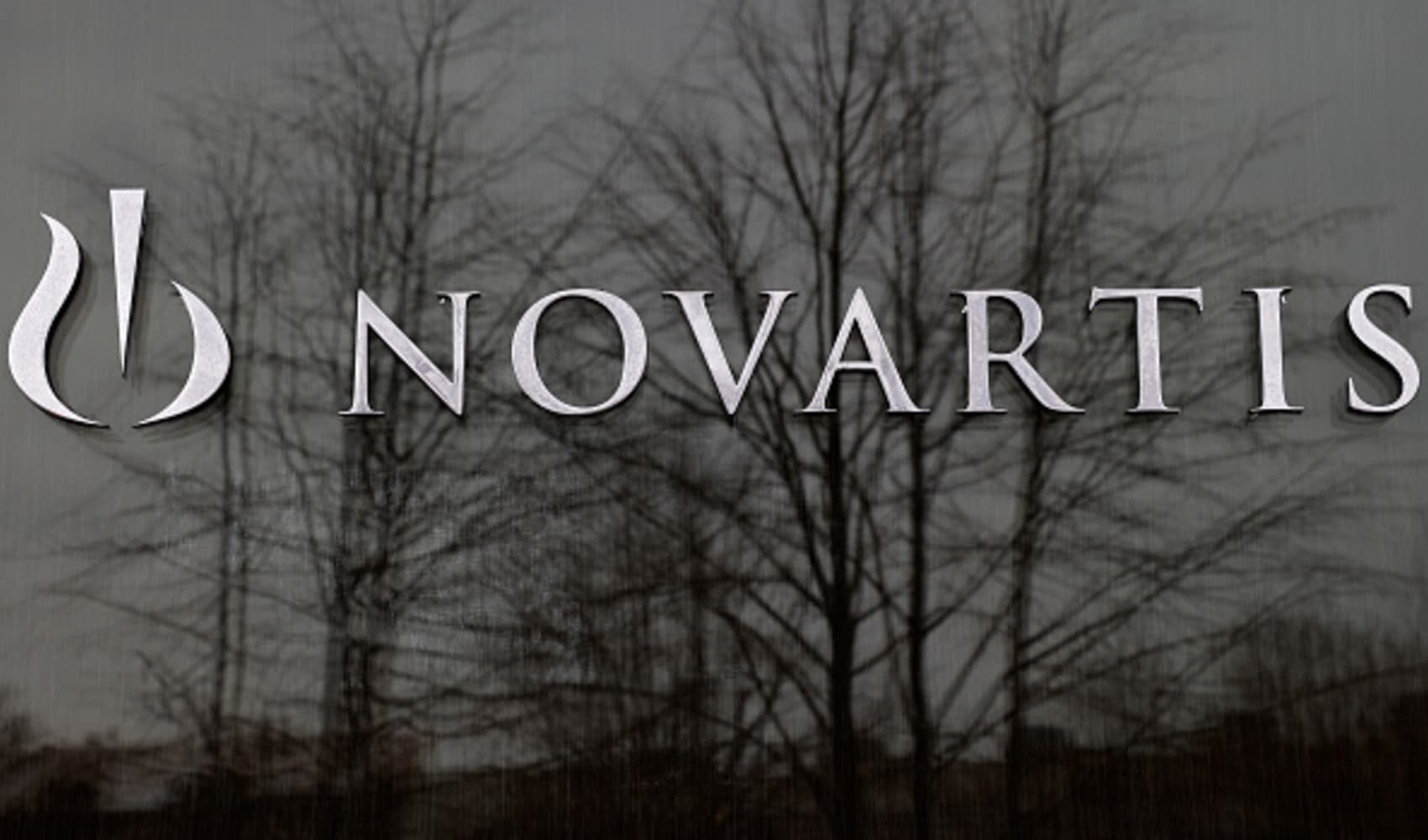
- Taking a cruise or heading abroad this year? You might have to be immunized against Covid — and have the "vaccine passport" to prove it.
- Many travel industry leaders have come out against mandatory vaccine passport usage.
- The U.S. is not developing a nationwide vaccine passport, so some private concerns are crafting their own, but the European Union and other countries like Israel have developed official standards.
Needing documents to travel is nothing new — after all, checking in for a flight requires some form of ID, and if you're bound for somewhere foreign, it'll have to be a passport. The same goes for car or train trips that cross the U.S. border, where from 2023 you'll need that blue booklet or a state-issued Real ID.
But a passport to simply check into a hotel or board a cruise ship? It's a distinct possibility in this age of pandemic-related restrictions. The idea of so-called vaccine passports proving inoculation against Covid-19 is gaining momentum in some quarters, as consumer interest in travel and tourism picks up along with the pace of vaccination.
Nearly half, or 46%, of vaccinated Americans plan to travel this summer, according to marketing software company Redpoint Global. And once more travel restrictions are lifted, 79% of them plan to travel as often or more as they did pre-pandemic. With more than 105 million Americans fully vaccinated, according to the Centers for Disease Control and Prevention, that means that more than 48 million could be traveling soon.
Get Southern California news, weather forecasts and entertainment stories to your inbox. Sign up for NBC LA newsletters.
More from Personal Finance:
How travelers could benefit from hotel industry struggles
What to expect as live music events take to the stage again
State Dept. says 80% of world is unsafe. What to know
"We have heard anecdotally about increased demand from some of our travel and hospitality customers," said John Nash, chief marketing and strategy officer for Redpoint Global. "Vaccine passports may prove to be very important to travel growth, but only time and consumer requirements will tell."
The vaccine passport concept is a simple one, according to Molly Fergus, general manager of travel website TripSavvy.
Money Report
"So far, the vaccination passports I've seen are [smartphone] apps that verify a user's vaccination or negative Covid-test status," she said. "These have QR codes or other identification features that allow passport holders to securely enter restaurants, bars, concerts or other shared spaces — all depending on the regulations of the city, state or country."
The Biden administration has gone on record as saying there are no plans for a national vaccine passport or certificate of vaccination for the entire U.S.
Individual jurisdictions, however, may decide differently; New York state, for instance, issues Excelsior Passes to residents who have been vaccinated or tested negative for Covid so they can gain admittance to certain venues and events. Florida Gov. Ron DeSantis, on the other hand, signed an executive order April 2 banning such vaccine passports in the Sunshine State.
"It doesn't seem like there's going to be one specific vaccine passport for use in the U.S.," said Victoria Walker, senior travel reporter with travel website The Points Guy. "The White House has pretty much said 'we're leaving this up to the private sector.'"
The European Union, on the other hand, is developing a so-called digital green certificate that would enable those among its nearly 500 million citizens who have been vaccinated or recently recovered from Covid to travel freely among the 27 member nations and avoid quarantine. And Israel, which has the world's highest vaccination rate, requires fully immunized residents to furnish a paper or digital "Green Pass" to access public places like gyms, theaters and hotels.
The new EU certificates might apply to U.S. and U.K. citizens who can prove vaccination, as well; European Commission President Ursula von der Leyen told The New York Times on April 25 that the EU as soon as summer would unconditionally admit travelers inoculated with vaccines approved by the European Medicines Agency.
"Other countries that have health-care concerns, high possibility of transmission or reemergence of cases might consider this passport as a way to be protective to the native citizens," said Dr. Jessica Shepherd, chief medical officer at health website Verywell Health. "It is a way to easily access proof of immunization."
There's all sorts of controversy swirling around the topic of vaccine passports. Some health experts and rights groups question the value and fairness of such documents in light of the uncertain duration of the protection vaccines afford and a lack of enough access to them in poorer nations. And a U.K. poll released in late April showed that 1 in 5 unvaccinated people said they'll resent those who are inoculated if they don't get their shots in time for summer vacation.
Controversies and concerns aside, development of vaccine passport apps continues apace.
The International Air Travel Association, advocating for about 290 airlines worldwide, is testing its IATA Travel Pass, an initiative to design and test an app to help air passengers manage travel and prove they've been vaccinated against or tested for Covid. At last count, 29 carriers — none from the U.S. — are participating in a trial.
Other efforts include the Vaccination Credential Initiative backed by Microsoft and the Mayo Clinic, which hopes to roll out its passport technology this month.
The World Health Organization came out against vaccine passports earlier this year. In a Jan. 15 statement, the WHO said that "at the present time, do not introduce requirements of proof of vaccination or immunity for international travel as a condition of entry, as there are still critical unknowns regarding the efficacy of vaccination in reducing transmission and limited availability of vaccines." It added that proof of vaccination should not exempt travelers from taking other Covid-related health and safety precautions.
The World Travel and Tourism Council, meanwhile, agrees with the WHO about vaccination but welcomed initiatives that would help the industry recover amid pandemic restrictions. Pointing to what promises to be a busy summer travel season this year, Gloria Guevara, president and CEO of the London-based WTTC said "it should not be required that a person be inoculated in order to travel."
"The global vaccination process will take a significant amount of time and we should not discriminate against those who wish to travel but have not been vaccinated, such as those in different age groups or from less advanced countries," she added. However, Guevara said efforts like the EU certificate that prove inoculation, positive antibodies or a negative Covid test allow "safety precautions to prevail while taking a major step towards recovery of the travel and tourism sector."
The council is also calling for testing on departure and arrival, mandatory masking and enhanced health and hygiene protocols to "allow the safe resumption on international travel, avoid the risk of transmission, save jobs and help fill the gap in the global economy."
James Ferrara, co-founder and president of Delray Beach, Florida-based InteleTravel — a network of some 60,000 home-based travel advisors — said he doesn't think "it's the travel industry's place to regulate vaccination."
He said that while vaccination being required for access to certain places where it's possible to maintain a bubble after boarding — "possibly on an airplane, possibly on a cruise ship" — there's no way to guarantee that all travelers and the people they're mingling with have been inoculated. He doesn't foresee tour operators or resorts requiring shots, for instance.
Redpoint Global customer Xanterra Travel Collection is requiring vaccination for passengers on sailings by its Windstar Cruises yachts, said Nash. The cruise line also provides free antigen testing prior to boarding.
TripSavvy's Fergus, however, said she can't imagine domestic U.S. airlines trying to enforce vaccination rules. "Without a federal passport standard, it would be a nightmare to enforce between states," she said. "International travel is more likely to require this type of proof, though I predict that passport and immigration control — not the airlines themselves — will be enforcing the entry requirements."
Ferrara said the large numbers of people averse to vaccination against Covid must be acknowledged. "In a certain community, there are very real fears and concerns about vaccination," he said. "So all of that has to be dealt with."
While TripSavvy has not measured Americans' support for vaccine passports, Fergus pointed to a poll from the de Beaumont Foundation that shows terminology might be playing a role. "The word 'passport' itself decreases Americans' trust, while terms like 'verification' or 'certificate' are more likely to garner support," she said. "Americans want to be in places that are safe and Covid-free, but they don't want to feel like their privacy is at risk." Political orientation is also a factor, as CNBC has reported.
For its part, Expedia Group has researched consumer sentiment about vaccine passports and found in a May survey of 2,200 Americans that they're almost even split: While 46% support the idea, 29% are against and 24% are undecided.
The Points Guy's Walker noted that vaccine access is uneven worldwide and may remain so for years. "The good-faith argument I have seen is that requiring [passports] could serve as a barrier to people who are not necessarily ... anti-vaxxers but don't have access to an actual vaccine," she said. "If not done correctly, it could really lead to a kind of 'haves vs. have-nots' in terms of travel."
A screen full of passports?

But what can those who do get vaccinated use when they need to prove it to border agents or hotel managers? In some cases, the vaccination card issued by the CDC that immunized people are given after their shots currently will do.
Iceland, for example, is admitting Americans with CDC cards proving full immunization; they also must test on arrival, however, and briefly quarantine until the results are available. A looser policy might be implemented from June 1, according to the Icelandic government. (On Sunday, the first Delta Air Lines flight from the U.S. to Iceland this year — a nearly full flight from Boston — landed at Keflavik airport, outside capital city Reykjavik. Daily service from Boston starts May 20, followed by Minneapolis a week later.)
There is, unfortunately, growing traffic in fake CDC cards and other types of bogus vaccination documentation, so international regulations like Iceland's might have to be adjusted.
Ultimately, individual travel product and service providers might end up furnishing customers with their own vaccine passport-type apps featuring those QR codes, said Walker. "Think of it as you would about your travel pre-Covid," she said. "Many people with smartphones kept a travel folder on their home screen, [where] you would have your various airlines, different hotels and rental car companies, and what-have-you."
For at least the next year or two, Walker said, Americans will likely have to juggle various vaccine passport or digital health certificate apps. "If you're flying on one airline, you might use one specific passport; if you're then arriving into a specific country, you might use another specific passport," she added. "It doesn't seem that we're going to see one streamlined pass for use among Americans, at least for now."
The good news is, according to industry figures, that vaccine passports likely won't be necessary, at least domestically, in the long run. "Once we hit herd immunity, I don't see us using vaccine passports to enter stadiums or eat in restaurants," said Fergus. "But for traveling internationally, a reliable worldwide standard that proves vaccination status — for many types of vaccines — could be incredibly useful."
In the meantime, if you're heading out on vacation, research and download any local passes, she said. "They're typically free, won't hurt you, and they could make your trip simpler and more fun."
Correction: An earlier version misspelled TripSavvy.






